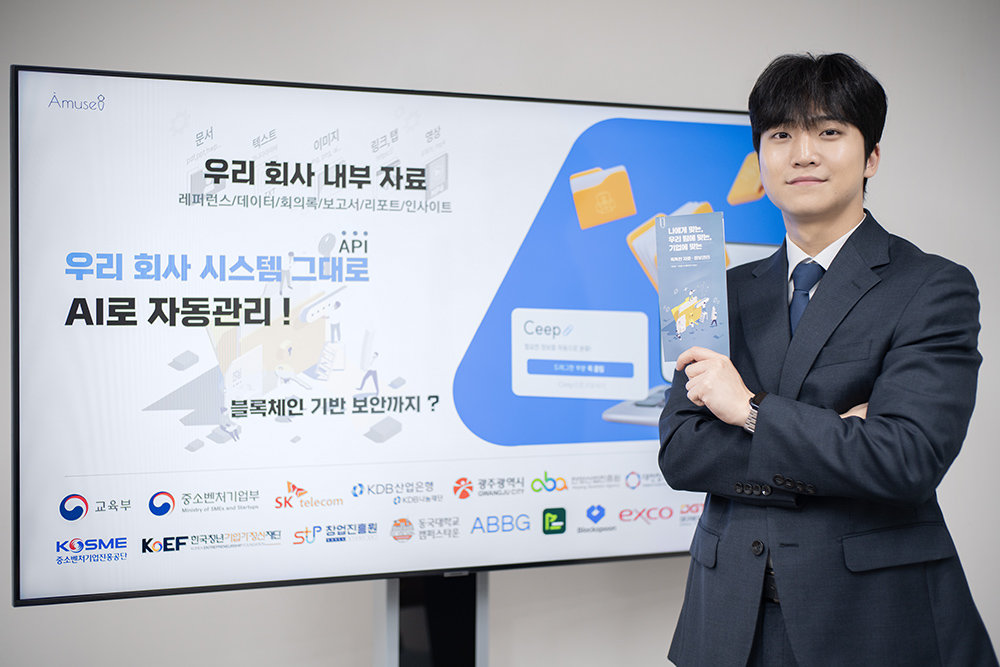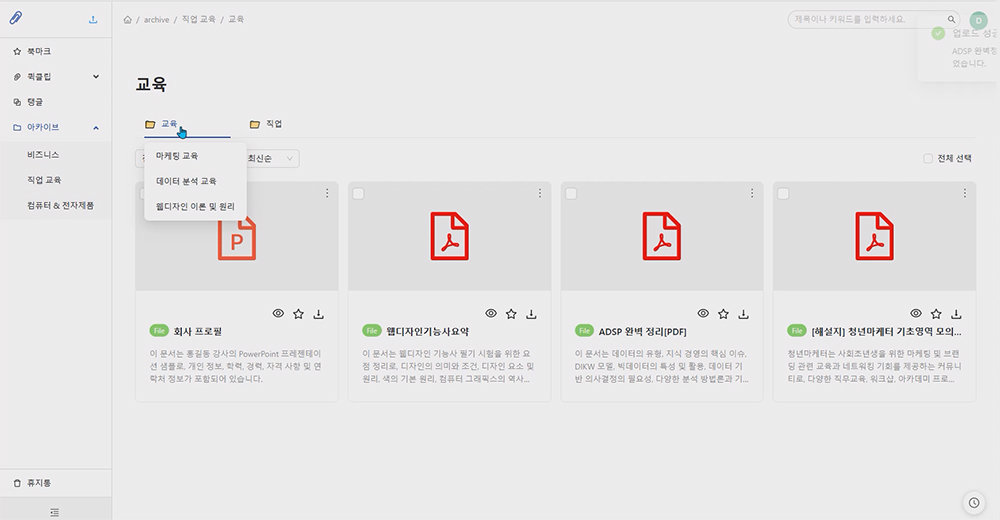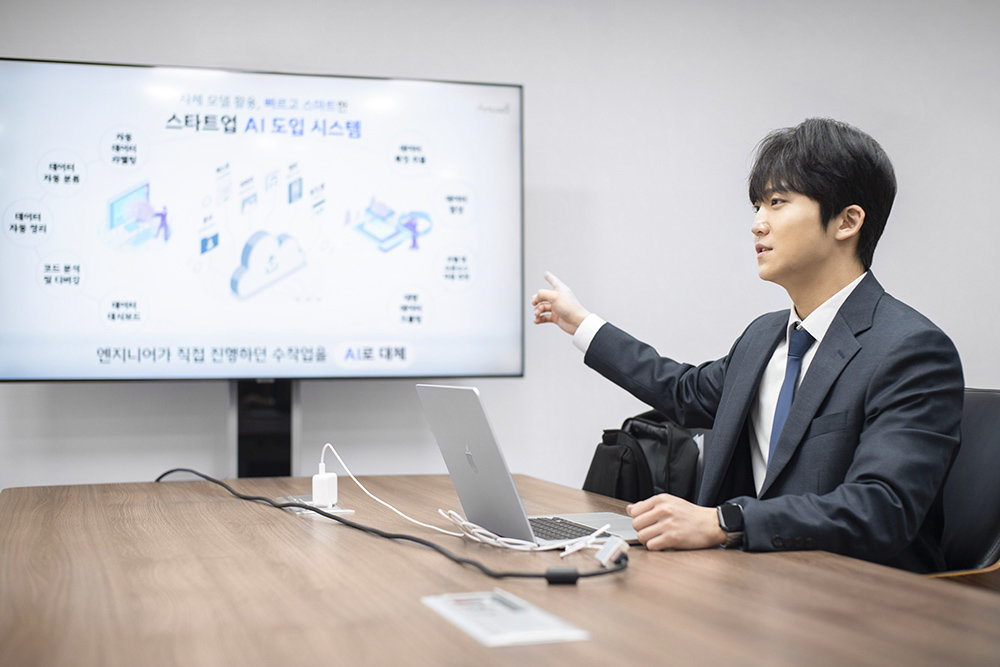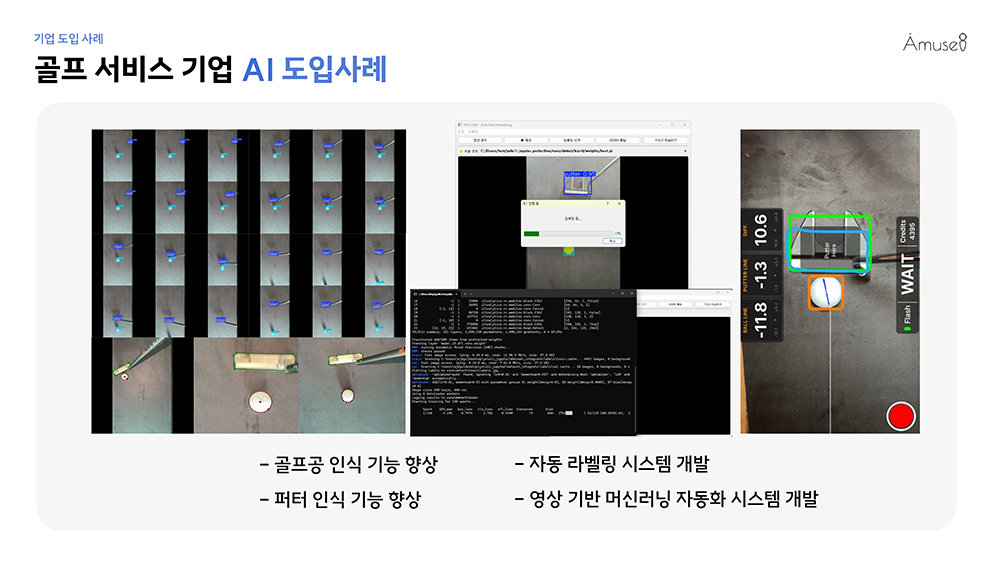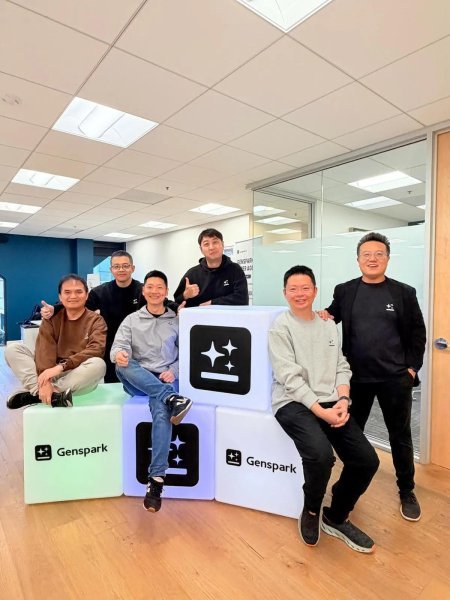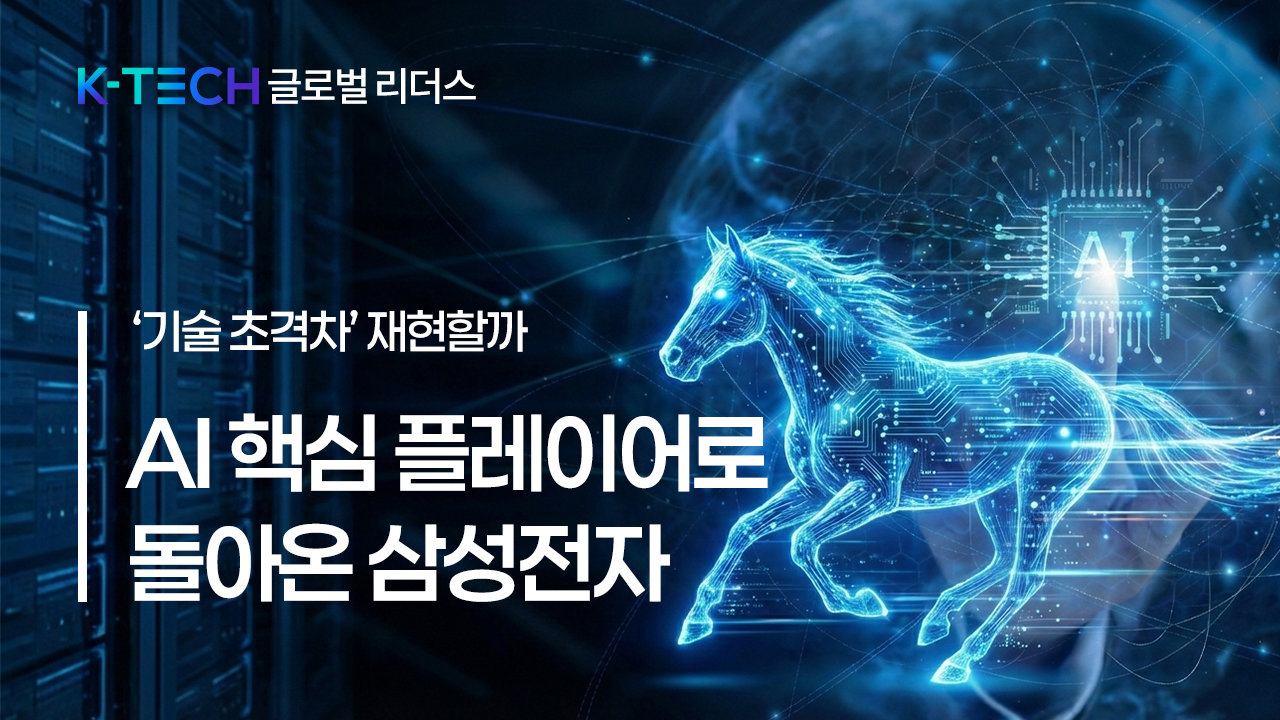
IT / Artificial Intelligence
Amuse8: AI Auto-Tagging Transforms Data Management
Dong-A Ilbo |
Updated 2025.10.28
[Dongguk University Campus Town X IT Donga] Dongguk University has participated in the Seoul Campus Town project since 2022, creating a startup ecosystem in the northwestern urban area. By supporting deep tech and cultural content startups, it was selected as an excellent case of startup nurturing for two consecutive years and received an A+ grade in the 2024 Seoul Campus Town performance evaluation. IT Donga introduces promising startups developing with Dongguk University Campus Town.
"Many office workers store information across various channels such as notepads, messengers, emails, and collaboration tools. Using multiple devices can lead to duplication or dispersion. According to Adobe, 35.8% of office workers face difficulties in managing materials, resulting in a 20% decrease in work productivity and an annual cost of around KRW 30 million for companies. The idea to solve information management with artificial intelligence (AI) was the beginning of Amuse8."
Amuse8 is developing an AI-based information management automation system called 'CEEP'. It uses self-developed AI to analyze documents or materials, generate tags, and automatically categorize them according to the user's work, characteristics, industry patterns, and more. Fundamentally, it is a document organization service within companies, but it is also applied in various ways, including AI data labeling. An interview with CEO Dongmin Shin provided insights into the background of planning the CEEP service and its application cases.
AI engine learning user classification methods enhances search and work efficiency
CEO Dongmin Shin founded Amuse8 in June last year. Initially, he envisioned a service that considered preference similarity for specific service industries to provide tailored recommendations to consumers. However, he became fascinated with processing big data using AI and began self-studying the technology. CEO Shin explained, "I started self-studying with just the thought of what could be created with AI. I learned by consulting professors and developers from the lab at school, and registered research achievements based on AI data analysis and preference similarity analysis as patents. Based on this, I established Amuse8 in June last year and completed the development of the initial version in September, putting the business on track."
When asked to explain how CEEP works, CEO Shin said, "In the course of work, a single document can be divided into several versions. Documents with similar content are mixed and stored, and differences arise depending on the storage medium. Usually, people store them according to their own rules, making it difficult to share with others or leading to forgetfulness. When CEEP is activated, only the metadata of each file is uploaded to the cloud for analysis, and tags matching the document content are generated. Based on this, files are organized according to pre-set document organization rules."
He continued, "Document organization rules can be set according to company regulations, and new organization methods can be specified according to characteristics or types of information. Stored information can be easily found and checked by others in a search engine format. The engine is optimized according to the desired organization and utilization plans of the adopting company."
Efficiency through customized corporate services··· Provided in API form
The optimization process begins from the first meeting stage. CEO Shin stated, "Although we have not yet started promotion or marketing, companies come to us first requesting meetings. In the first meeting, we check the company's data holdings and information management system, and how they plan to use it. Many companies propose their own criteria or layouts, and we devise and propose the optimal solution based on these. It can be integrated into existing in-house services in the form of an application programming interface (API), and repetitive tasks or manual classifications can also be developed to match, resulting in direct and indirect cost or time savings."
The time required for implementation varies depending on the scale and complexity, ranging from as short as one week to as long as two months. CEO Shin explained, "Currently, we only accept business-to-business (B2B) contracts. Our service is implemented in one of the major domestic corporations, and it is provided in various forms to local governments and support institutions such as Gwangju Metropolitan City and Daejeon Creative Economy Innovation Center. Some companies have automated customer documents by linking them with customer relationship management (CRM) or connected them with marketing."
When asked if the automatic classification feature might be applied slightly differently from the original plan, he said, "Some manual organization may be required. However, since the concept itself is based on tag generation, documents can be checked in a search engine format, and new configurations can be requested according to conditions."
Processing unstructured data like photos and videos into semi-structured data with CEEP, automating AI learning
An interesting aspect is that certain companies have started using CEEP's AI-based automatic labeling feature for organizing AI learning data. Typically, data labeling requires accurate or minimal error classification, but if precision is not necessary, weak labeling can be applied using titles or tags to simply distinguish data.
Initially, CEEP's AI automatic labeling was intended for file organization or document organization optimization by recognizing metadata. It involves inserting unstructured data for AI learning as is, generating tags, and applying weak labeling for immediate use in AI learning. It appears relatively inexpensive and highly utilizable in terms of cost and usability.
CEO Shin stated, "Among the implementation cases, there is one where the AI automatic labeling function was linked with object recognition AI to replace tasks that were manually performed nearly 100,000 times a day with simple video recording combined with AI labeling. Companies that need to completely rebuild datasets are showing interest."
A representative case is Linematics. Linematics provides a service that measures the path, speed, angle, and distance of a golf putt using a smartphone app. When a smartphone is placed on a swing trainer and the putter is swung, the camera recognizes the data and provides results. CEO Shin stated, "Linematics is developing an AI that recognizes golf putting through object recognition. The challenge was to train all different shapes of golf putters. Previously, after filming, the frames were divided, and the recognition areas were designated one by one to train the data, amounting to tens of thousands of cases."
He continued, "By applying data labeling to the manual classification system of each image using CEEP, it is now fully automated to create file units per frame after filming, building an AI dataset. Originally, existing learned data was needed for data labeling, but the method of dividing the original data itself into files and classifying them worked."
Gradual growth achieved with the support of Dongguk University··· Aiming for greater growth next year
The connection with Dongguk University Campus Town began when CEO Shin applied for the 'HAI STARTUP TOWN Competition' last year. This competition selects prospective or early-stage entrepreneurs in the fields of deep tech, cultural content, and regional coexistence who wish to reside in Dongguk University Campus Town. Amuse8 was selected in the deep tech field, receiving free office support, and was also selected for the preliminary startup package in the same year. This year, it is part of the Seoul Youth Employment Academy program.
CEO Shin explained, "Dongguk University provided not only office space but also diverse support such as corporate networking, expert consulting, management, and investment attraction mentoring. Actual contracts or collaborations were achieved through corporate networking, and management mentoring helped resolve issues I had been pondering alone." He also participated in an IR day considering future investment attraction, gaining an objective basis to assess the status of other tech companies and Amuse8's business status.
Thanks to the efforts of Dongguk University Campus Town, the business was well established in its early stages, but determining the future direction is up to CEO Shin. He stated, "Since everything is new, I spend a lot of time thinking about how to steer the business. I strategize on how to differentiate from competitors and which direction to take. Rather than focusing on funding or investment, I plan to focus more on advancing in the right direction technically."
Challenging AI services based on tags for all data
Although the fourth quarter of this year remains, CEO Shin states that all the goals set at the beginning of the year have been achieved. Finally, CEO Shin said, "We have achieved more than double the sales target set at the beginning of the year, and we have reached the goals for personnel expansion and AI engine upgrades. We have secured partner companies and even prepared cases of adoption by large corporations, already setting a clearer direction for next year's goals. Next year, the goal is to scale up the business significantly and create an AI service based on an information retrieval engine that can manage data with tag-centric technology."
IT Donga Nam Si-hyun Reporter (sh@itdonga.com)
"Many office workers store information across various channels such as notepads, messengers, emails, and collaboration tools. Using multiple devices can lead to duplication or dispersion. According to Adobe, 35.8% of office workers face difficulties in managing materials, resulting in a 20% decrease in work productivity and an annual cost of around KRW 30 million for companies. The idea to solve information management with artificial intelligence (AI) was the beginning of Amuse8."
Dongmin Shin, CEO of Amuse8 / Source=IT Donga
Amuse8 is developing an AI-based information management automation system called 'CEEP'. It uses self-developed AI to analyze documents or materials, generate tags, and automatically categorize them according to the user's work, characteristics, industry patterns, and more. Fundamentally, it is a document organization service within companies, but it is also applied in various ways, including AI data labeling. An interview with CEO Dongmin Shin provided insights into the background of planning the CEEP service and its application cases.
AI engine learning user classification methods enhances search and work efficiency
CEO Dongmin Shin founded Amuse8 in June last year. Initially, he envisioned a service that considered preference similarity for specific service industries to provide tailored recommendations to consumers. However, he became fascinated with processing big data using AI and began self-studying the technology. CEO Shin explained, "I started self-studying with just the thought of what could be created with AI. I learned by consulting professors and developers from the lab at school, and registered research achievements based on AI data analysis and preference similarity analysis as patents. Based on this, I established Amuse8 in June last year and completed the development of the initial version in September, putting the business on track."
Through the CEEP service, data on a computer can be organized, tagged, and structured into the desired format / Source=Amuse8
When asked to explain how CEEP works, CEO Shin said, "In the course of work, a single document can be divided into several versions. Documents with similar content are mixed and stored, and differences arise depending on the storage medium. Usually, people store them according to their own rules, making it difficult to share with others or leading to forgetfulness. When CEEP is activated, only the metadata of each file is uploaded to the cloud for analysis, and tags matching the document content are generated. Based on this, files are organized according to pre-set document organization rules."
He continued, "Document organization rules can be set according to company regulations, and new organization methods can be specified according to characteristics or types of information. Stored information can be easily found and checked by others in a search engine format. The engine is optimized according to the desired organization and utilization plans of the adopting company."
Efficiency through customized corporate services··· Provided in API form
The optimization process begins from the first meeting stage. CEO Shin stated, "Although we have not yet started promotion or marketing, companies come to us first requesting meetings. In the first meeting, we check the company's data holdings and information management system, and how they plan to use it. Many companies propose their own criteria or layouts, and we devise and propose the optimal solution based on these. It can be integrated into existing in-house services in the form of an application programming interface (API), and repetitive tasks or manual classifications can also be developed to match, resulting in direct and indirect cost or time savings."
After collecting data, tags are automatically added, and the collected data can be organized according to company-specified rules / Source=IT Donga
The time required for implementation varies depending on the scale and complexity, ranging from as short as one week to as long as two months. CEO Shin explained, "Currently, we only accept business-to-business (B2B) contracts. Our service is implemented in one of the major domestic corporations, and it is provided in various forms to local governments and support institutions such as Gwangju Metropolitan City and Daejeon Creative Economy Innovation Center. Some companies have automated customer documents by linking them with customer relationship management (CRM) or connected them with marketing."
When asked if the automatic classification feature might be applied slightly differently from the original plan, he said, "Some manual organization may be required. However, since the concept itself is based on tag generation, documents can be checked in a search engine format, and new configurations can be requested according to conditions."
Processing unstructured data like photos and videos into semi-structured data with CEEP, automating AI learning
An interesting aspect is that certain companies have started using CEEP's AI-based automatic labeling feature for organizing AI learning data. Typically, data labeling requires accurate or minimal error classification, but if precision is not necessary, weak labeling can be applied using titles or tags to simply distinguish data.
Initially, CEEP's AI automatic labeling was intended for file organization or document organization optimization by recognizing metadata. It involves inserting unstructured data for AI learning as is, generating tags, and applying weak labeling for immediate use in AI learning. It appears relatively inexpensive and highly utilizable in terms of cost and usability.
CEO Shin stated, "Among the implementation cases, there is one where the AI automatic labeling function was linked with object recognition AI to replace tasks that were manually performed nearly 100,000 times a day with simple video recording combined with AI labeling. Companies that need to completely rebuild datasets are showing interest."
Linematics applied CEEP's labeling function to enhance the AI model that enables golf putters to recognize golf balls / Source=Amuse8
A representative case is Linematics. Linematics provides a service that measures the path, speed, angle, and distance of a golf putt using a smartphone app. When a smartphone is placed on a swing trainer and the putter is swung, the camera recognizes the data and provides results. CEO Shin stated, "Linematics is developing an AI that recognizes golf putting through object recognition. The challenge was to train all different shapes of golf putters. Previously, after filming, the frames were divided, and the recognition areas were designated one by one to train the data, amounting to tens of thousands of cases."
He continued, "By applying data labeling to the manual classification system of each image using CEEP, it is now fully automated to create file units per frame after filming, building an AI dataset. Originally, existing learned data was needed for data labeling, but the method of dividing the original data itself into files and classifying them worked."
Gradual growth achieved with the support of Dongguk University··· Aiming for greater growth next year
The connection with Dongguk University Campus Town began when CEO Shin applied for the 'HAI STARTUP TOWN Competition' last year. This competition selects prospective or early-stage entrepreneurs in the fields of deep tech, cultural content, and regional coexistence who wish to reside in Dongguk University Campus Town. Amuse8 was selected in the deep tech field, receiving free office support, and was also selected for the preliminary startup package in the same year. This year, it is part of the Seoul Youth Employment Academy program.
Amuse8 signed a memorandum of understanding with Gwangju Metropolitan City this year for cooperation in the AI industry and service implementation / Source=IT Donga
CEO Shin explained, "Dongguk University provided not only office space but also diverse support such as corporate networking, expert consulting, management, and investment attraction mentoring. Actual contracts or collaborations were achieved through corporate networking, and management mentoring helped resolve issues I had been pondering alone." He also participated in an IR day considering future investment attraction, gaining an objective basis to assess the status of other tech companies and Amuse8's business status.
Thanks to the efforts of Dongguk University Campus Town, the business was well established in its early stages, but determining the future direction is up to CEO Shin. He stated, "Since everything is new, I spend a lot of time thinking about how to steer the business. I strategize on how to differentiate from competitors and which direction to take. Rather than focusing on funding or investment, I plan to focus more on advancing in the right direction technically."
Challenging AI services based on tags for all data
Although the fourth quarter of this year remains, CEO Shin states that all the goals set at the beginning of the year have been achieved. Finally, CEO Shin said, "We have achieved more than double the sales target set at the beginning of the year, and we have reached the goals for personnel expansion and AI engine upgrades. We have secured partner companies and even prepared cases of adoption by large corporations, already setting a clearer direction for next year's goals. Next year, the goal is to scale up the business significantly and create an AI service based on an information retrieval engine that can manage data with tag-centric technology."
IT Donga Nam Si-hyun Reporter (sh@itdonga.com)
AI-translated with ChatGPT. Provided as is; original Korean text prevails.
ⓒ dongA.com. All rights reserved. Reproduction, redistribution, or use for AI training prohibited.
Popular News







